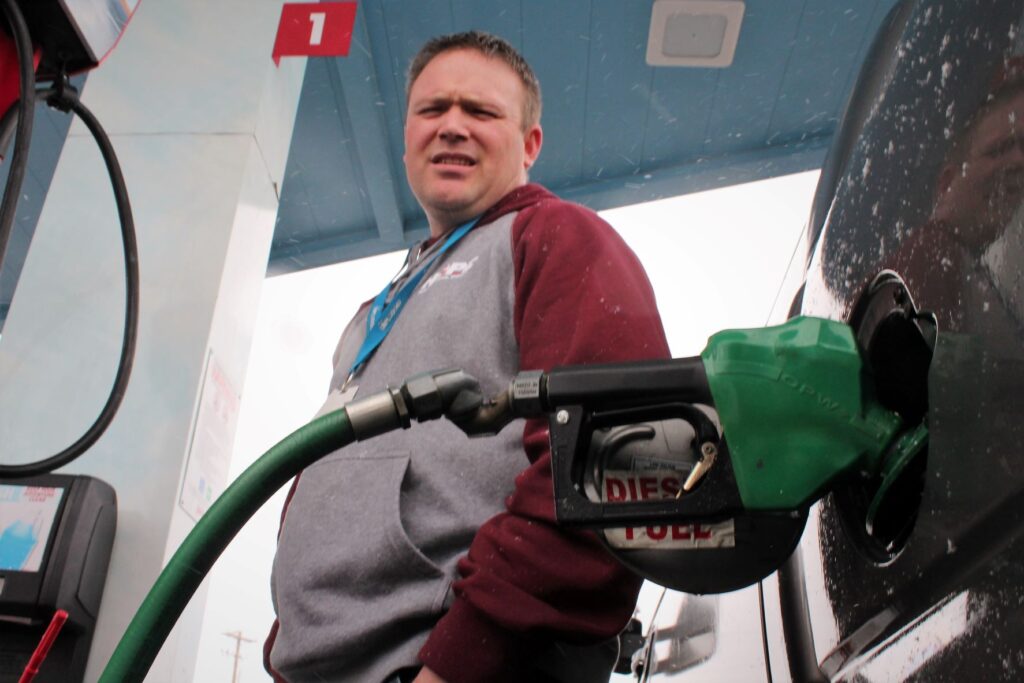Hyrum resident Anthony Frenzel teaches school in Brigham City fills is truck with diesel fuel on Tuesday March 8, 20222.
LOGAN-With the conflict raging between Russia and Ukraine crude prices are shooting through the roof leading to the highest pump prices in U.S. history. GasBuddy a fuel saving platform reported yesterday the national average for a gallon of gas is currently at $4.104, breaking a 2008 record of $4.103 for the highest gas prices up to that point.

Most gas stations in Cache Valley have regular unleaded gas listed at $4.19.9 per gallon as of Tuesday March 8.
Patrick De Haan, head of petroleum analysis at GasBuddy said Americans have never seen gasoline prices this high, nor have we seen the pace of increases so fast and furious.
“That combination makes this situation all the more remarkable and intense, with crippling sanctions on Russia curbing their flow of oil, leading to the massive spike in the price of all fuels: gasoline, diesel, jet fuel and more,” he said. “It’s a dire situation and won’t improve any time soon. The high prices are likely to stick around for not days or weeks, like they did in 2008, but months. GasBuddy now expects the yearly national average to rise to its highest ever recorded.”
The gas prices in 2008 peaked just before the U.S. Great Recession and housing crisis.
The national average price of diesel will also likely to break the current record of $4.846 per gallon in the next two weeks causing shipping prices to go up as well.
Consumers can expect the current trend at the pump to continue as crude prices climb.

There are suggestions on line to help automobile operators get the most out of their tank of gas.
AAA has a Gas Watchers Guide they published in 2018 with tips for conserving fuel, saving money and maintaining fuel efficiency.
Here are some of their suggestions.
- If your vehicle’s engine does not require premium or mid-grade fuel, don’t buy it. Using anything other than regular grade is simply a waste of money.
- Don’t top off your gas tank. Stop filling after the automatic nozzle shuts off the second time.
- If you have to replace a gas cap, make sure it is the right one for your car. An ill-fitting cap will increase emissions and trigger the “check engine” light.
- Keep track of gas mileage. If you notice a sudden decrease in fuel economy, have your vehicle checked by a technician to ensure it is operating properly.
- Bad driving isn’t just unsafe. It’s expensive. Adopting new and improved driving behaviors not only makes car travel safer it can contribute to significant savings at the gas pump.
- Maintain your car according to the manufacturer’s recommendations. Modern cars don’t need “tune ups,” but regular service will ensure optimum fuel economy, performance and longevity.
- Take your car to a repair shop as soon as possible if the “Check Engine” light comes on. This indicates a problem that is causing excessive emissions and likely reducing fuel economy.
- Keep tires properly inflated. Underinflation reduces fuel economy, but more importantly, tires low on air degrade handling and braking, wear more rapidly and can overheat and blowout.
- Slow down and drive the speed limit. On the highway, aerodynamic drag causes fuel economy to drop off significantly as speeds increase above 50 mph.
- Avoid “jackrabbit” starts and hard acceleration.
- Avoid prolonged idling in general. If your car will be stopped for more than 60 seconds, shut off the engine to save fuel.
- When driving in town, adjust your speed to “time” the traffic lights. This reduces repeated braking and acceleration that consume additional fuel.
- When approaching a red light or stop sign, take your foot off the gas early and allow your car to coast down to a slower speed until it is time to brake.
- Accelerate smoothly with light to moderate throttle. This allows the automatic transmission to upshift into higher gears sooner, reducing engine rpm and saving fuel.
- Use cruise control to help maintain a constant speed and save fuel. However, never use cruise control on slippery roads because a loss of vehicle control could result.
- Minimize your use of air conditioning. Even at highway speeds, open windows have less effect on fuel economy than the engine power required to operate the air conditioning compressor.
- Plan ahead to accomplish multiple errands in one trip, and whenever possible travel outside high-traffic times of day.

